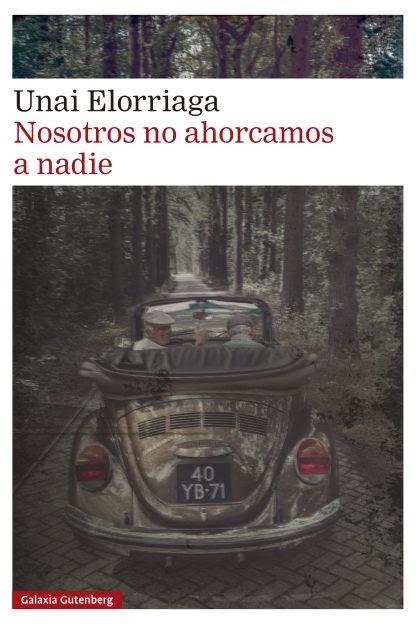
Original Language: inhale
Títutulu Original: Source
Translator: Unai Elorriaga
Year of publication: 2019
Valoración: Highly recommended
In this work, Elorriaga recovers a genre as ancient as literature itself, we could say: that of the framed narrative, in which a main narrative entanglement serves as a rise for a set of independent stories. A genre that we could ride until Decameron O off Canterbury storiesor even further back to the A thousand and one nights. (Even Obabakowith its particular eccentric structure, it could be included in this genealogy). Of course, Elorriaga gives his particular turn to the genre, establishing a much more tense and intense relationship between individual stories and the main narrative.
And what is it, ultimately, Iturria/we do not hang anyone? Because of two elderly lords (which inevitably remembers ): Soro Barturen (eccentric and wealthy, capable of leaving € 10,000 of tip or paying thousands of euros for a translation of a story) and erroman (which serves as a narrator witnessing the adventures of Soro, as a mixture of Sancho Panza and Doctor Watson), that they travel all Central Europe, chasing the mysterious Pedro Iturria, whom Soro Barturen met in his youth dedicated to publish two stories (never again) in different magazines from a certain country, before moving for the next. What the novel offers us, therefore, is both the narration of Soro’s trip and errome, and the stories that Iturria is publishing, which are identified by its title but also by the country in which they appear.
The most interesting thing about the work, perhaps, is that the sections corresponding to the-Marco narration (that is, to the “real” world of the novel, so to speak) consist, in large part, in a discussion of the stories between soro themselves, which is a sharp and inquisitive (and also a little impertinent) literary critic and other characters, frequently the translators of the stories (since these are not originally written in the language They publish, but are written in Spanish, or in Basque, or perhaps in English, and then translated, which serves to raise very interesting issues about language, culture and translation). It is true that, with the passage of the pages, this resource ends up being a bit repetitive, but it also offers dazzling and hilarious moments in the dialogue between Soro Barturen and its interlocutors (and frequently, victims), with the sections in Vizcaíno dialect (as informs us a footnote) so that they can only be understood by their “Compinche” errome.
And in the middle, of course, there are the stories in themselves, of which I will not say that all are brilliant, do offer a very interesting variety and originality, with some stories that enter the fantastic, in the post (or pre) apocalyptic, or in the Borgiano-Kafkian, as in the story that gives title to the book, and that personally seems to me the best of all. These are always stories with a certain margin of ambiguity or mystery, which gives rise to the subsequent discages of Soro, but also so that the reader himself actively participates in that game of interpretation of the possible meanings of the text, making a kind of practical experience of reader response theorythat is, of the multiple answers that the same text can cause.
Although my impression has been that, to some extent, the narrative artifact deflates a little in the second half, due to the exhaustion of the resource, and because the novelties that are introduced do not just be able to refloat it, it is in any case an original, surprising and provocative reading, which alternates moments of absurd humor with others much more serious. A highly recommended reading, and that can serve to meet again with this writer, brand new (although modest) winner of the National Narrative Prize.
Source: https://unlibroaldia.blogspot.com/2025/08/unai-elorriaga-nosotros-no-ahorcamos.html


